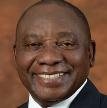Deputy President Cyril Ramaphosa: Reply to questions in the National Assembly, Parliament, June 10 2015
10 Jun 2015
Question
In view of the lessons from fast-growing economies like China, where parastatals have played the major role in economic growth, while in South Africa it seems that parastatals are not adding value to economic growth, (a) what steps has he taken with regard to the South African Airways, Eskom and the SA Post Office to change the situation, particularly because it is mainly caused by poor appointments of the Board including executive directors and (b) does he intend to change the Government’s approach of deploying political cadres in strategic positions while they are not competent?
Reply
Honourable Members,
State owned companies are an important part of the South African economy and remain essential to advancing government’s industrialisation programme and broader development objectives.
Over the past ten years, parastatals have accelerated investment in the economy, which has fuelled growth and helped mitigate the impact of the 2008 global financial crisis.
Over the past four years, state owned companies have invested nearly R470 billion in the economy.
While South Africa’s state owned companies have been largely successful in carrying forward the mandate of the developmental state, there have also been significant challenges.
These challenges have been identified in the Presidential Review Committee on State-Owned Entities, which has made a number of far-reaching recommendations.
The Cabinet Lekgotla held earlier this year mandated the Office of the Deputy President to oversee the implementation of these recommendations.
As we reported in the Presidency Budget Vote Debate, notable progress has been made in turning around Eskom, South African Airways and the South African Post Office.
With the support of the war room located in the Presidency, progress has been made in the implementation of government's five-point plan on electricity as well as the elements of the government support package. Governance and leadership challenges at Eskom are being addressed.
In addition, government has tabled the bills for the appropriation of the R23 billion equity injection it committed to provide to Eskom and the amendment bill for the conversion to equity of the subordinated loan. Both of these interventions will strengthen Eskom’s financial position. Government is firmly on track with the sale of the assets to fund the allocation to Eskom which will ensure that there is no impact on the Budget deficit.
Other examples of progress made include improvements in performance at Majuba and Duvha power stations and extension of IPP contracts.
The going concern status of South African Airways has been restored, through the 90 Day Action Plan cost savings of R1.2 billion will be realised. The long term turnaround strategy is being refined and has been encapsulated into the company’s corporate plan.
Under the leadership of the Administrator, a strategic turnaround plan has been developed for the Post Office. A thorough diagnostic review was undertaken and a business model that is better suited to the changing postal services environment has been developed.
There are several reasons why some state owned companies under-perform, including high operating costs, and poor operational performance, unclear policy frameworks, from difficult, highly competitive and rapidly changing operating environments and weak management and governance.
Governance is one of the key areas that need to be strengthened.
In December 2014, Cabinet approved the establishment of a task team to develop common principles for persons nominated to serve on boards of state and state controlled institutions.
It is critical that people appointed to the boards of state owned companies demonstrate the requisite experience, skills and commitment to effectively fulfil their functions. This is an imperative that government takes seriously and to which he dedicates much time and effort.
We must dispel the myth that the people who run our parastatals are ill-equipped to do so, or that they occupy their positions merely by virtue of political affiliation.
An honest assessment of leadership in our parastatals will prove that such claims are untrue.
I thank you.
Issued by The Presidency, June 10 2015

